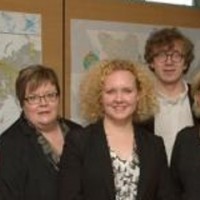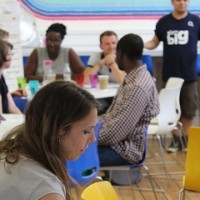 Chema Alonso
Chema Alonso
Chief Data Officer, Telefonica.
Every once in a while, you will read or experience something that puts into words what you have struggled to articulate all your life. For me, that moment came as I read Gretchen Rubin’s take on happiness. This formula is not magic, nor is it secret, but it might be surprising: Happiness is thinking about feeling good, feeling bad, feeling right, in an atmosphere of growth.
As Rubin describes it an atmosphere of growth is, in other words, learning. It was after reading this that my outlook on education and unemployment really clicked into place; a paradigm shift of some sorts.
We so often talk about learning as a necessity for society; we need people who can be accountants, we need people who can give medical care. But from Rubin’s perspective, we are talking about learning as a fundamental component of happiness.
Rubin is not alone in isolating growth, development or learning as a key part of the happiness formula. In the same vein, Mihály Csíkszentmihály speaks of the beauty of “Flow” – the state of focus that we find ourselves immersed in when we concentrate on tasks that really matter to us, or that we love doing, and Sir Ken Robinson talks about “finding your Element” – discovering what it is that you both love to do and excel at doing.
So why is school still perceived by children as bad tasting medicine – necessary but unpleasant – if it is so crucial to our happiness?
Sir Ken Robinson proposes his answer to this question in the RSA Animate talk “Changing Education Paradigms“; he argues that our current system is broken and in serious need of disruption. How can we expect children and young people to be motivated when there seems to be such a disconnect between what is taught in school and the skills needed in the workforce? How can we even come close to helping children experience learning in an atmosphere of growth, when we insist on delivering education with an approach derived from the Industrial Revolution?
And these issues are undeniable intertwined with a wider issue; skills shortage and youth unemployment. If children and teenagers, along with their families, see schools as a sole source of education, there are high chances that many will finish school disengaged with learning, and frustrated that they do not have the skills to get the job they want.
Ronan Dunne, CEO of O2 UK, set out a call to action in his City AM article about the digital skills shortage in the UK. He highlighted the shift in responsibility from being solely on the educational system as it stands, to the individuals. While we must demand that the level of public, free education is a priority for our governments’ budget, it would be irresponsible to perpetuate the myth that real learning can only happen in classrooms or established institutions. In fact, it would be dangerous. By doing so, you erect a barrier to access for so many people.
In a world where free courses and opportunities to learn are plentiful in the internet, it is up to us to disrupt the system. Luckily, we have large organisations willing to help us; Coursera, Edx, TED, CodeAcademy, SkillFeed among others.
But challenges still remain: how can we make these resources even more accessible and better known? How can we help children and young people set off on their path of personal learning in a society that has been dominated by the traditional teacher-pupil paradigm for so long
That is where events like One Young World have a role to play as, in the words of Robinson, “the fact is that given the challenges we face, education doesn’t need to be reformed — it needs to be transformed.” Where better a place than OYW to begin looking for an answer?
Watch Claire’s One Young World submission video to get an idea as to the topics she’ll be covering at this summit. You can also follow all of the OYW action via #TelefonicaOYW
[youtube]https://www.youtube.com/watch?v=y49StmmrOKg [/youtube]
Claire Rampen (@clairerampen), Graduate at Telefonica
This post has originally been published on the Think Big Community Hub.












